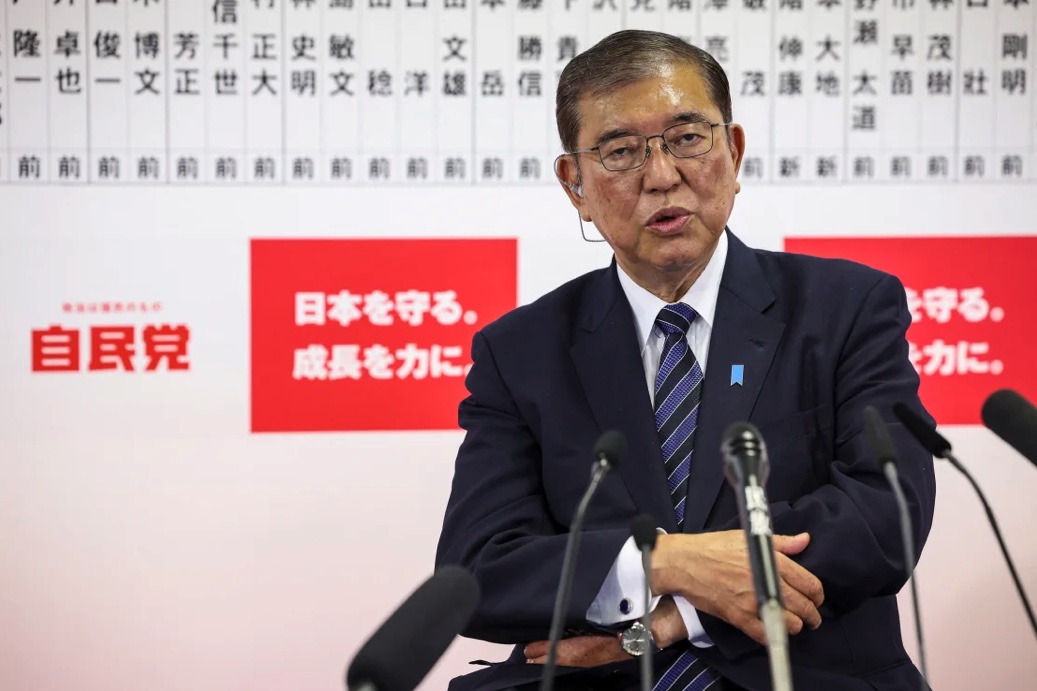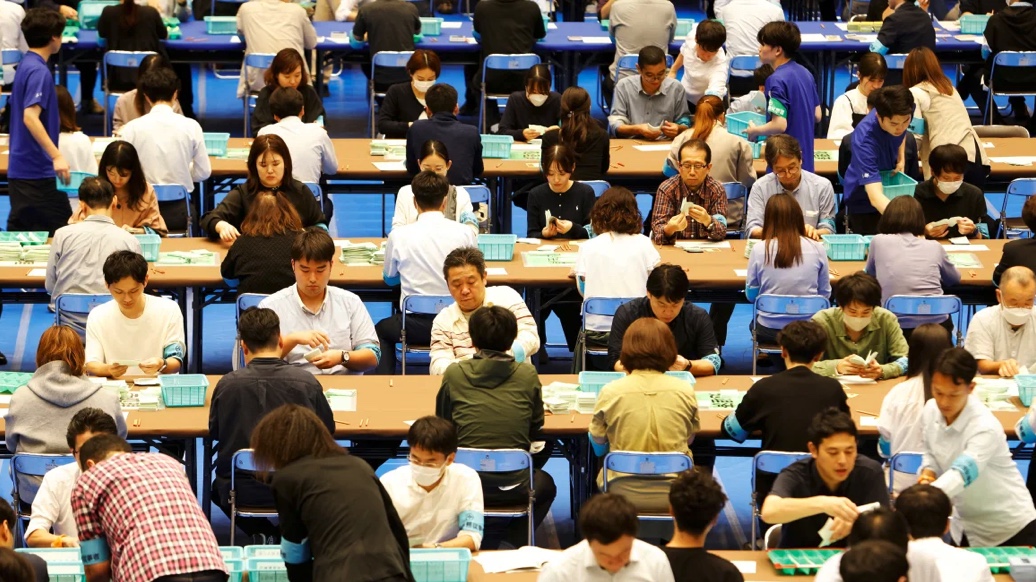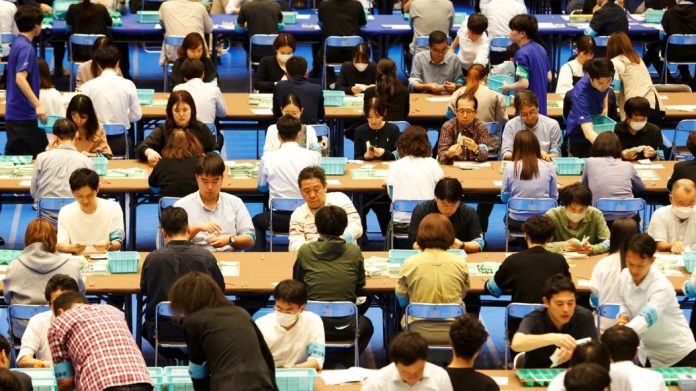พรรคเสรีประชาธิปไตย (LDP) ของญี่ปุ่นที่ครองอำนาจมายาวนาน สูญเสียเสียงข้างมากในสภาผู้แทนราษฎรครั้งแรกในรอบ 15 ปี จากผลการเลือกตั้งทั่วไปเมื่อวันอาทิตย์ที่ผ่านมา ซึ่งนับเป็นการกระทบกระเทือนใหญ่ต่อรัฐบาลของนายกรัฐมนตรีคนใหม่ ชิเกรุ อิชิบะ ท่ามกลางความไม่พอใจของประชาชนต่อเศรษฐกิจที่ตกต่ำและข่าวอื้อฉาวทางการเมือง
พรรค LDP และพรรคพันธมิตรโคเมโตะ ได้ที่นั่งเพียง 215 จากทั้งหมด 465 ที่นั่งในสภาล่าง ขาดเกณฑ์ 233 ที่นั่งที่จำเป็นเพื่อครองเสียงข้างมาก ตามรายงานของสถานีโทรทัศน์แห่งชาติ NHK ซึ่งนับเป็นครั้งแรกนับตั้งแต่ปี 2009 ที่พรรค LDP สูญเสียเสียงข้างมากในสภาล่าง
นายกรัฐมนตรีอิชิบะกล่าวว่า ผู้ลงคะแนนได้ส่ง “คำตัดสินที่รุนแรง” มายังพรรคของเขา จากรายงานของ NHK
ก่อนการเลือกตั้งครั้งนี้ พรรค LDP และโคเมโตะมีเสียงข้างมากที่มั่นคงถึง 279 ที่นั่ง โดย LDP ครองอยู่ที่ 247 ที่นั่ง แต่ในวันอาทิตย์ที่ผ่านมา พรรคได้ที่นั่งเพียง 191 ที่นั่ง ขณะที่พรรคฝ่ายค้านหลักคือพรรคประชาธิปไตยรัฐธรรมนูญแห่งญี่ปุ่น (CDPJ) ได้รับ 148 ที่นั่ง เพิ่มขึ้นอย่างมากจากเดิมที่ 98 ที่นั่ง โดยผู้นำพรรค CDPJ โยชิฮิโกะ โนดะ กล่าวในงานแถลงข่าวว่า “เป้าหมายของเราคือการล้มเสียงข้างมากของพรรครัฐบาล และเราทำสำเร็จ ถือเป็นความสำเร็จที่ยิ่งใหญ่”
อิชิบะ อดีตรัฐมนตรีว่าการกระทรวงกลาโหม ตัดสินใจจัดการเลือกตั้งกลางคันหลังจากชนะการเลือกตั้งภายในพรรคเมื่อเดือนที่แล้ว โดยหวังที่จะสร้างความชอบธรรมให้กับรัฐบาล
ผลการเลือกตั้งสะท้อนถึงความไม่แน่นอนทางการเมือง ซึ่งอาจทำให้อิชิบะต้องดิ้นรนในการจัดตั้งรัฐบาล โดยอาจต้องดึงพรรคการเมืองอื่นเข้าร่วมเป็นพันธมิตรหรือเลือกจัดตั้งรัฐบาลเสียงข้างน้อย ซึ่งทั้งสองทางเลือกนี้ทำให้ตำแหน่งนายกรัฐมนตรีของอิชิบะตกอยู่ในความเสี่ยง

ความท้าทายใหม่
ก่อนการเลือกตั้ง พรรค LDP เผชิญกับคะแนนนิยมที่ลดลงและความไม่พอใจของประชาชนต่อหนึ่งในข่าวอื้อฉาวทางการเมืองครั้งใหญ่ของประเทศ รวมถึงค่าครองชีพที่พุ่งสูงขึ้นจากค่าเงินเยนที่อ่อนตัว เศรษฐกิจชะลอตัว และอัตราเงินเฟ้อที่สูงขึ้น
ข่าวอื้อฉาวเกี่ยวกับเงินทุนซึ่งมีเงินหลายล้านดอลลาร์ที่ไม่ได้รับการบันทึกอย่างถูกต้อง โดยมีการกล่าวหาว่า นักการเมืองบางรายใช้เงินในทางมิชอบหรือไม่รายงานรายได้ตามกฎหมาย อดีตนายกรัฐมนตรีฟุมิโอะ คิชิดะพยายามแก้ไขปัญหานี้โดยปรับคณะรัฐมนตรีและยุบกลุ่มภายในพรรค แต่ก็ถูกเรียกร้องให้ลาออกและประกาศเมื่อเดือนสิงหาคมว่าจะไม่ลงสมัครรับตำแหน่งอีกสมัย
นายกรัฐมนตรีอิชิบะ ผู้มีประสบการณ์ทางการเมืองมากมาย ได้สัญญาว่าจะช่วยเหลือทางการเงินแก่ครอบครัวรายได้น้อย ปรับขึ้นค่าแรงขั้นต่ำ และฟื้นฟูภูมิภาคต่าง ๆ ตามรายงานของรอยเตอร์ เขายังสัญญาว่าจะจัดการกับภาวะเงินเฟ้อของประเทศอย่างเต็มที่ และมุ่งมั่นที่จะเพิ่ม “การเติบโตในค่าแรงที่แท้จริง”
ในแง่การต่างประเทศ อิชิบะให้ความสำคัญกับความสัมพันธ์ระหว่างญี่ปุ่นและสหรัฐฯ และต้องการกระชับความสัมพันธ์กับพันธมิตรเพื่อรับมือกับความท้าทายด้านความมั่นคงในเอเชีย โดยเฉพาะจากจีนและเกาหลีเหนือที่แสดงท่าทีแข็งกร้าวมากขึ้น
ก่อนหน้านี้ อิชิบะในฐานะรัฐมนตรีว่าการกระทรวงกลาโหมมีจุดยืนที่เข้มงวดในการป้องปราม และเคยเสนอแนวคิดจัดตั้งองค์การพันธมิตรความมั่นคงในเอเชียคล้ายกับ NATO แต่ข้อเสนอดังกล่าวไม่ได้รับการตอบรับจากสหรัฐฯ จึงทำให้เขาละทิ้งแนวคิดนี้ไป
ในวัฒนธรรมการเมืองที่ให้ความสำคัญกับความเป็นเอกภาพ อิชิบะนับเป็นบุคคลที่โดดเด่นและมีลักษณะเป็นตัวของตัวเอง กล้าที่จะแสดงความคิดเห็นขัดแย้งกับพรรค ซึ่งถึงแม้จะทำให้เขามีศัตรูในพรรค LDP แต่ก็ทำให้เขาเป็นที่ชื่นชอบในหมู่ประชาชนระดับรากหญ้า
Japan’s ruling party loses long-standing majority in major blow to new PM

Japan’s longtime ruling party has lost its majority for the first time in 15 years as Sunday’s general election dealt a major blow to new Prime Minister Shigeru Ishiba amid public anger over economic woes and a series of political scandals.
The ruling Liberal Democratic Party and its coalition partner Komeito secured just 215 of the lower house’s 465 seats, short of the 233 needed to reach a majority, according to the national broadcaster NHK.
This is the first time since 2009 that the LDP has lost its majority in the lower house of the Diet, the national parliament. The LDP, a conservative political machine, has ruled the country almost continuously since the party’s founding in 1955.
Ishiba said voters had delivered a “severe judgement” to his party, NHK reported.
Ahead of the elections, the LDP and its junior partner Komeito had a stable majority of 279 seats while the LDP alone had 247. On Sunday, the LDP won just 191 seats.
The main opposition Constitutional Democratic Party of Japan (CDPJ) won 148 seats, a significant increase from 98. CDPJ leader Yoshihiko Noda said in a press conference Sunday, “Our goal was to break the ruling party’s majority, and we achieved it, which is a great accomplishment.”
Ishiba, a former defense minister, called a snap election shortly after winning the party’s leadership contest last month, seeking to reinforce his public mandate.

The result signals political uncertainty as Ishiba may now struggle to form a government.
To remain in power, the LDP could try and bring other parties into its coalition or rule via a minority government, with both options putting Ishiba’s position as prime minister in jeopardy.
Fresh setback
Before the election the LDP faced falling approval ratings and public discontent over one of the country’s biggest political scandals in decades, as well as increasing living costs, which have been exacerbated by the weak yen, a sluggish economy and high inflation.
The funding scandal involved millions of dollars in undocumented political funds, and lawmakers allegedly lining their own pockets with kickbacks or failing to properly declare their income.
Former Prime Minister Fumio Kishida tried to contain the damage by replacing several cabinet ministers and dissolving LDP factions, essentially coalitions within the party. But he faced calls to resign and announced in August that he would not run for a second term.
Ishiba, a political veteran, has pledged financial help to low-income households, a higher minimum wage, and regional revitalization, according to Reuters. He has also promised a “full exit” from Japan’s high inflation rates, vowing to achieve “growth in real wages.”
Ishiba has made strengthening Japan’s relations with the United States a priority and seeks deeper ties with allies amid growing security challenges in Asia, including an increasingly assertive China and belligerent North Korea.
Partnership with Japan has long been central to US strategy in the Asia-Pacific region, and Ishiba’s predecessor Kishida this year expanded Japan’s defense cooperation with its key ally. Ishiba has called for a more balanced relationship, including having greater oversight of US military bases in Japan, Reuters reports.
As defense minister, Ishiba was strong on deterrence as a security issue. He even proposed an Asian version of the NATO security bloc, an idea he has apparently dropped after it was rebuffed by the US.
In a political culture that prizes conformity, Ishiba has long been something of an outlier, willing to criticize and go against his own party. That willingness to speak out has made him powerful enemies within the LDP but endeared him to more grassroots members and the public.
By Helen Regan and Yumi Asada, CNN

















